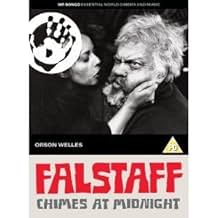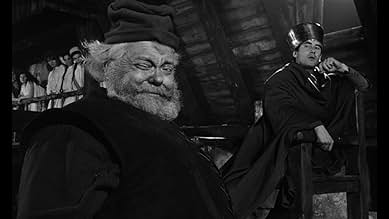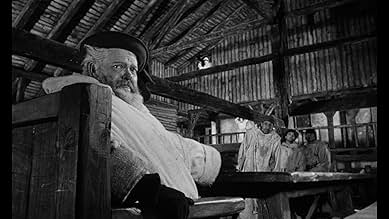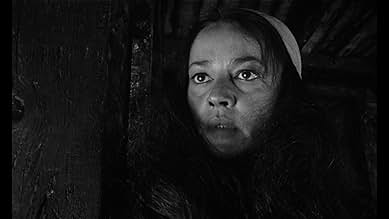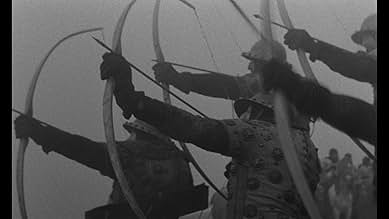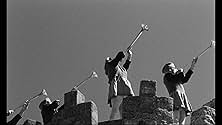AVALIAÇÃO DA IMDb
7,6/10
11 mil
SUA AVALIAÇÃO
Adicionar um enredo no seu idiomaWhen King Henry IV ascends to the throne, his heir, the Prince of Wales, is befriended by Sir John Falstaff, an old, overweight, fun-loving habitual liar. Through Falstaff's eyes we see the ... Ler tudoWhen King Henry IV ascends to the throne, his heir, the Prince of Wales, is befriended by Sir John Falstaff, an old, overweight, fun-loving habitual liar. Through Falstaff's eyes we see the reign of King Henry IV and the rise of Henry V.When King Henry IV ascends to the throne, his heir, the Prince of Wales, is befriended by Sir John Falstaff, an old, overweight, fun-loving habitual liar. Through Falstaff's eyes we see the reign of King Henry IV and the rise of Henry V.
- Direção
- Roteiristas
- Artistas
- Indicado para 1 prêmio BAFTA
- 3 vitórias e 2 indicações no total
Michael Aldridge
- Pistol
- (as Michael Aldrich)
Andrés Mejuto
- Woman's Tailor
- (as Andres Mejuto)
José Nieto
- Northumberland
- (as Jose Nieto)
- Direção
- Roteiristas
- Elenco e equipe completos
- Produção, bilheteria e muito mais no IMDbPro
Avaliações em destaque
What can be said about Chimes at Midnight that hasn't already been said? Orson Welles' ode to Fallstaff, a part that Shakespeare obviously created with Welles' himself in mind, seems to be the perfect culmination of his enormous (no pun intended) career. The meager budget of the film is only reflected in the bad dubbing & sound quality, which is still glaring despite restoration efforts. Welles makes up for this in film noir lit faces, intense battle scenes, and of course, his impeccable acting & connection with the character. With the minute movement of his eye, he can garner laughter or sympathy. While we may be used to chuckling at Falstaff's bumbling, brazen arrogance, Welles also brings us, in the end, to profoundly feel the anguish that lies at the depths of Falstaff's soul. His performance seems to be a psychological study on fatherly influences, quite probably pulling from his experiences with his own Fallstaffian father, among others. Having recently watched My Own Private Idaho, it is hard not to make comparisons & observe the obvious inspiration Gus Van Sant drew from Chimes for his quintessential film. It was also interesting to watch the dramatic battle scenes, which on a shoestring budget are very cleverly shot & edited to feel big budget. This film has probably inspired many larger budget Shakespearean, war & movies in other genres, and yet stands in a league of its own.
Shakespeare Scholars are always complaining how this film used and abused Shakespeare's plays but I think what was done in this film was pretty clever: Take the character of Falstaff from several plays and piece them together to get a complete picture of the man.
Of the two Orson Welles Shakespeare films I've seen, this one and "Othello" (1954), both had the ability to make me want to read Shakespeare's plays and any film that makes you want to read what the author wrote is a very positive thing to say about a film. So there Shakespeare Scholars!
I did go out and buy the books with the plays used in this film, much like trying to solve a puzzle to see how the pieces really fit. And Orson did twist and bend things a little to make it come out his way.
I also read in Videohound's "World Cinema" (1999) by Elliot Wilhelm that this film may be getting a restoration. If it's as good a restoration as "Othello", I'm looking forward to it!
Welles as Falstaff really shines in this film and Falstaff's later rejection by Henry V is one of the most sobering in cinema. And Welles still has some very creative power left in him by 1965, look at the Battle of Shrewsbury scenes. When it comes to battle scenes they've been done probably only 10 different ways by 1000 directors in a 1000 movies over the years, but this one is probably the most memorable. It's also strange to have in the heat of battle Falstaff looking like a big metal beach ball running around back and forth trying to avoid any conflict.
This film is also a good example of good music and how to use it in a film and it's another one of my favorite movies about Merrie ol' England.
Of the two Orson Welles Shakespeare films I've seen, this one and "Othello" (1954), both had the ability to make me want to read Shakespeare's plays and any film that makes you want to read what the author wrote is a very positive thing to say about a film. So there Shakespeare Scholars!
I did go out and buy the books with the plays used in this film, much like trying to solve a puzzle to see how the pieces really fit. And Orson did twist and bend things a little to make it come out his way.
I also read in Videohound's "World Cinema" (1999) by Elliot Wilhelm that this film may be getting a restoration. If it's as good a restoration as "Othello", I'm looking forward to it!
Welles as Falstaff really shines in this film and Falstaff's later rejection by Henry V is one of the most sobering in cinema. And Welles still has some very creative power left in him by 1965, look at the Battle of Shrewsbury scenes. When it comes to battle scenes they've been done probably only 10 different ways by 1000 directors in a 1000 movies over the years, but this one is probably the most memorable. It's also strange to have in the heat of battle Falstaff looking like a big metal beach ball running around back and forth trying to avoid any conflict.
This film is also a good example of good music and how to use it in a film and it's another one of my favorite movies about Merrie ol' England.
By far the best of Welle's three Shakespearean adaptations this is also arguably THE best Shakespeare on screen. Most filmmakers go for the tragedies - vide Welles himself - or settle for Romeo and Juliet but the History plays are seldom tackled. Here the maestro dips into several texts - most heavily into the two parts of Henry 1V but also Merry Wives, Henry V, Richard 11 - and then welds them together seamlessly to give an in-depth portrait of Falstaff. With a nice touch of irony the narration is spoken by Ralph Richardson who, prior to Welles here, was the definitive Falstaff - and remains so as far as theatre is concerned. It's hard to fault so I won't try, merely revel in a touch of greatness. 10/10
10ednlaura
This is one of the great Shakespearean adaptations and a true 'lost classic'. It's also the last masterpiece that Orson Welles directed in his lifetime, and with 'Citizen Kane,' 'Magnificent Ambersons' and 'Touch of Evil' comprises a quartet of major cinematic works that he accomplished.
The film is an inventive re-editing and condensation of Shakespeare's plays, spanning from the end of Richard II to the beginning of Henry V. The film focuses on the character of Jack Falstaff, played by Welles himself in a virtuoso performance. Falstaff's relationship with young Prince Hal (later Henry V) is explored, and uncannily parallels Welles' own experience with the young talents of Hollywood.
Chimes at Midnight can be a jarring experience due to inconsistent film quality, low budget sets and Welles' flair for shock cuts, but it's a truly rewarding experience once you adapt to the style and limitations.
There are several great performances, by John Gielgud as Henry IV, Keith Baxter as Hal and Norman Rodway as Hotspur, who seems like a predecessor to Kenneth Branagh.
Chimes at Midnight has a little of everything: low comedy, highly artistic camera angles, exciting battle scenes (the battle of Shrewesbury scene influenced Braveheart) and a deeply moving story that Welles has 'discovered' between the lines of Shakespeare's histories.
The film is an inventive re-editing and condensation of Shakespeare's plays, spanning from the end of Richard II to the beginning of Henry V. The film focuses on the character of Jack Falstaff, played by Welles himself in a virtuoso performance. Falstaff's relationship with young Prince Hal (later Henry V) is explored, and uncannily parallels Welles' own experience with the young talents of Hollywood.
Chimes at Midnight can be a jarring experience due to inconsistent film quality, low budget sets and Welles' flair for shock cuts, but it's a truly rewarding experience once you adapt to the style and limitations.
There are several great performances, by John Gielgud as Henry IV, Keith Baxter as Hal and Norman Rodway as Hotspur, who seems like a predecessor to Kenneth Branagh.
Chimes at Midnight has a little of everything: low comedy, highly artistic camera angles, exciting battle scenes (the battle of Shrewesbury scene influenced Braveheart) and a deeply moving story that Welles has 'discovered' between the lines of Shakespeare's histories.
I won't belabor the point that you can gather from reading 40+ other reviews, so I will offer a few short words on the theme of the movie, as well as caveat, for watching Orson Welles' Chimes at Midnight.
The film overall deals with that time-honored notion noted by St. Paul "When I was a child, I used to talk like a child, and see things as a child does, and think like a child; but now that I have become an adult, I have finished with all childish ways." Prince Hal is growing up and becoming an adult, and as such must soon leave his childish pranks and habits behind. His friend, Falstaff, is that childhood friend (paradoxically old in age, as if he never grew up himself). Boisterous, drunk, and a glutton, the blowhard gleefully recounts all the good times that he, Prince Hal, and their other misfits used to have, doing the things that children and adolescents do, like being a nuisance, harassing others, and goofing off. It is the type of life Falstaff still leads and he is quite happy with it. Prince Hal is, too, until the weight of responsibility is slowly thrust upon him thanks to his sick father. As the stakes are raised, he slowly loses the time and desire to be a silly young boy and now must be a man.
Falstaff is oblivious to this development all the way until the end, thinking that these are just momentary phases before the parties can begin anew. He is ever hopeful that the Prince and the world will see things his way. He fails to see how the world moves past a fat, blundering fool. His love for the prince, for the girls of the bawdy bar, for his compatriots is, while sometimes humorous and self-serving, he nonetheless wishes no real ill on anyone and merely lives for fun and pleasure. In his old age, he has decided that being an adult (if he ever was one) is not something worth putting time and energy in to. He is unimportant and carefree enough to have that luxury; however, his closest friends cannot shirk away from their duties as men, and thus Falstaff fails to realize how he is left behind.
All of this is turned into a moving portrait. We realize that Falstaff is wrong, and that sometimes the world calls for more than just joking around, goofing off and indulging one's self. But we sympathize with him, because we can see a gentle and loving person underneath the bluster and idiocy - and perhaps we ourselves wish the world were more "childish" and carefree. At the climactic battle scene (were Welles' camera work makes a hundred men or less look like a thousand), men grind and pulverize each other into hamburger meat - but Falstaff never manages to hurt a single soul. Perhaps there is some good in being childish!
For those wishing to watch the movie, the Criterion package is an excellent one. The customary supplemental materials are fascinating, and the picture brings out Welles' cinematography. Criterion and co. did there best with the sound, and the sound is the biggest single issue with which you will struggle with (or at least I did) with Chimes. Even with work done on it, the sound levels are inconsistent, especially with actors' lines. Sometimes whole scenes will go by with what sounds like dubbers mumbling their lines, straining your ears and making you crank the volume up on your TV. Then all of the sudden someone will speak loudly and clearly, blowing you back with the force of it and making you quickly turn the volume back down... only for the process to repeat again. I have not done this yet, but I would probably recommend watching with subtitles on to help alleviate the issue of figuring out what some of the whispers and mumbles are supposed to be. Not an elegant solution, but with Welles' later work, you will have to deal with some technical issue or another.
Don't let the above turn you off from seeing this beautiful, and moving film. It is a worthy adaptation and remix of Shakespeare and one of Welles' greatest movies.
The film overall deals with that time-honored notion noted by St. Paul "When I was a child, I used to talk like a child, and see things as a child does, and think like a child; but now that I have become an adult, I have finished with all childish ways." Prince Hal is growing up and becoming an adult, and as such must soon leave his childish pranks and habits behind. His friend, Falstaff, is that childhood friend (paradoxically old in age, as if he never grew up himself). Boisterous, drunk, and a glutton, the blowhard gleefully recounts all the good times that he, Prince Hal, and their other misfits used to have, doing the things that children and adolescents do, like being a nuisance, harassing others, and goofing off. It is the type of life Falstaff still leads and he is quite happy with it. Prince Hal is, too, until the weight of responsibility is slowly thrust upon him thanks to his sick father. As the stakes are raised, he slowly loses the time and desire to be a silly young boy and now must be a man.
Falstaff is oblivious to this development all the way until the end, thinking that these are just momentary phases before the parties can begin anew. He is ever hopeful that the Prince and the world will see things his way. He fails to see how the world moves past a fat, blundering fool. His love for the prince, for the girls of the bawdy bar, for his compatriots is, while sometimes humorous and self-serving, he nonetheless wishes no real ill on anyone and merely lives for fun and pleasure. In his old age, he has decided that being an adult (if he ever was one) is not something worth putting time and energy in to. He is unimportant and carefree enough to have that luxury; however, his closest friends cannot shirk away from their duties as men, and thus Falstaff fails to realize how he is left behind.
All of this is turned into a moving portrait. We realize that Falstaff is wrong, and that sometimes the world calls for more than just joking around, goofing off and indulging one's self. But we sympathize with him, because we can see a gentle and loving person underneath the bluster and idiocy - and perhaps we ourselves wish the world were more "childish" and carefree. At the climactic battle scene (were Welles' camera work makes a hundred men or less look like a thousand), men grind and pulverize each other into hamburger meat - but Falstaff never manages to hurt a single soul. Perhaps there is some good in being childish!
For those wishing to watch the movie, the Criterion package is an excellent one. The customary supplemental materials are fascinating, and the picture brings out Welles' cinematography. Criterion and co. did there best with the sound, and the sound is the biggest single issue with which you will struggle with (or at least I did) with Chimes. Even with work done on it, the sound levels are inconsistent, especially with actors' lines. Sometimes whole scenes will go by with what sounds like dubbers mumbling their lines, straining your ears and making you crank the volume up on your TV. Then all of the sudden someone will speak loudly and clearly, blowing you back with the force of it and making you quickly turn the volume back down... only for the process to repeat again. I have not done this yet, but I would probably recommend watching with subtitles on to help alleviate the issue of figuring out what some of the whispers and mumbles are supposed to be. Not an elegant solution, but with Welles' later work, you will have to deal with some technical issue or another.
Don't let the above turn you off from seeing this beautiful, and moving film. It is a worthy adaptation and remix of Shakespeare and one of Welles' greatest movies.
Você sabia?
- CuriosidadesDespite portraying Falstaff as a grossly obese man, Orson Welles actually had to diet to slim down for the role.
- Erros de gravaçãoThe corpse of Hotspur opens and closes his mouth several minutes after his death.
- ConexõesFeatured in The 43rd Annual Academy Awards (1971)
Principais escolhas
Faça login para avaliar e ver a lista de recomendações personalizadas
- How long is Chimes at Midnight?Fornecido pela Alexa
Detalhes
- Data de lançamento
- Países de origem
- Idioma
- Também conhecido como
- Chimes at Midnight
- Locações de filme
- Calatañazor, Soria, Castilla y León, Espanha(London streets scenes)
- Empresas de produção
- Consulte mais créditos da empresa na IMDbPro
Bilheteria
- Orçamento
- US$ 800.000 (estimativa)
- Faturamento bruto nos EUA e Canadá
- US$ 126.724
- Fim de semana de estreia nos EUA e Canadá
- US$ 13.630
- 3 de jan. de 2016
- Faturamento bruto mundial
- US$ 126.724
- Tempo de duração
- 1 h 59 min(119 min)
- Cor
- Mixagem de som
- Proporção
- 1.66 : 1
Contribua para esta página
Sugerir uma alteração ou adicionar conteúdo ausente



